by Léa Charette
Highlight of Article:
The following is a transcription of an interview with professor Gao Chen-Hung. The interview’s aim was to explore traditional and modern Taiwanese folk culture in order to give foreign students and residents an in-depth understanding of the beliefs and superstitions unique to Taiwan.
Gao Chen-Hung (高振宏) is an associate professor at National Chengchi University’s Department of Chinese Literature. His research is centered on Taoism and folk beliefs, literature, and folklore. He kindly offered to share his expertise on Taiwanese traditional beliefs and their transformation in a globalized and interconnected world.
Foreigners living in Taiwan may not be overly familiar with the details of Taiwan’s religious tradition. Hence, this interview was conducted with an educational perspective in mind. Professor Gao’s discourse can be a reference for interested foreign students that are eager to research these topics, but who do not know where to start.
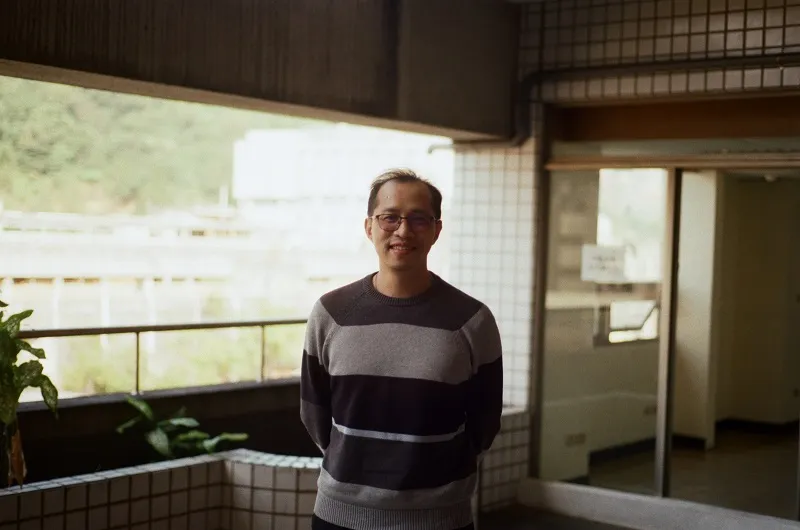
▲Portrait of Professor Gao Chen-Hung/Photo Credit: Léa Charette.
1. Please briefly introduce yourself, your work at NCCU and your educational background.
I grew up near Sanchong (三重) and was raised in a temple. My father worked as a gas deliveryman. I grew up in the mountains in a temple until junior high school and came to Taipei for school. I come from the Gao (高) family known for its intellectuals and scholars. The Gao family has five branches in the upper branch and seven branches in the lower branch, a total of twelve branches. Education is very important to our family. As I belong to the third branch of the upper branch, since I was a child, my dad used to tell me that we have a literary heritage to honour.
However, by the time I was growing up, our family had already been declining for successive generations. Becoming a professor was a primary goal to improve my family's situation. I also wanted to study in order to lighten my dad's burden. I attended National Chengchi University, where I studied Chinese throughout my undergraduate years and pursued both my master's and doctoral degrees, all in the Chinese department. It ultimately led to me becoming a professor in the Chinese Department here at NCCU.
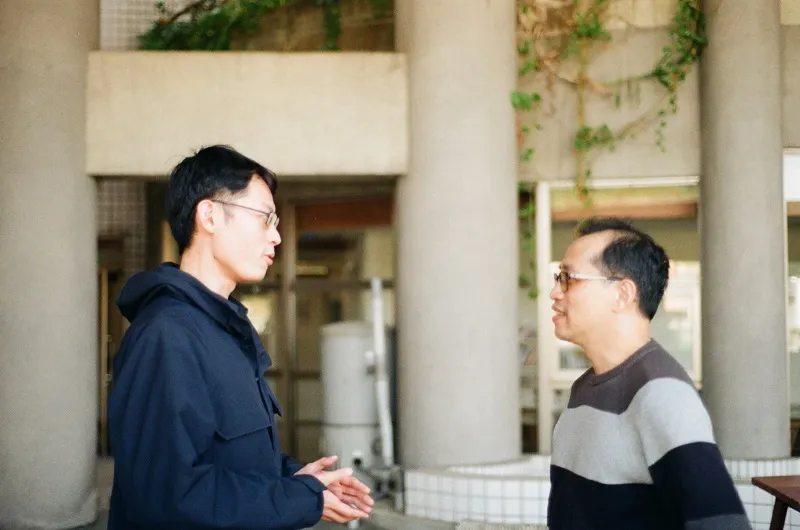
▲Professor Gao in a discussion with Chiu Yi-kai (邱奕凱) from OIC’s Cooperation & Exchange Section, who kindly assisted with the interview. Photo Credit: Léa Charette.
2. How has your family background and/or how you grew up influence your choice of studies?
My father is a committee member in a temple in Sanchong where I grew up. Throughout my childhood, I was constantly immersed in my surrounding religious culture and naturally became interested in it. Moreover, as a child I used to suffer from malnutrition and a rather weak constitution. I used to take medicine prescribed by the temple gods through divine mediums (乩童 jītóng).
Just like that, I grew up healthily from that point on. My sisters and I were saved by consuming the food and medicine that were blessed by the gods. We were lucky to experience healing through divine intervention. This helped foster a strong connection with temples and Taoism in me. I felt a sense of gratitude towards the deities that protected me, and felt it was my duty to do research in order to acknowledge those divine blessings.
3. You specialize in the study of Taoism in classical Chinese literature as well as Taiwanese folk beliefs. Could you tell us more about what exactly you found interesting in these two subjects?
What is interesting in the difference between folk beliefs and Taoism is that they serve different purposes. They come from two different energies, which are pronounced the same in Chinese: 炁 (Ch’i, primordial energy) versus 氣 (Qì, gas, vapor, breath). Taoism gods are said to come from this Ch’i, from the primordial force of creation. Conversely, in folk beliefs people worship humans which became deities, and who consequently are closer to them. Purity is emphasized in Taoism. The higher the gods, the purer/cleaner offerings people offer.
Folk beliefs are less restrictive. Offerings are more “common”, closer to us humans. They include offerings like fish, pork, and chicken (called 三牲 in Chinese, which means three kinds of meats). In this vein, folk beliefs often focus on practical requests - e.g. money, love -, while Taoism addresses more transcendental concerns. For example, students go to worship the Wenchang Wang (文昌王/文昌帝君) before taking an exam in the hopes of getting good results.
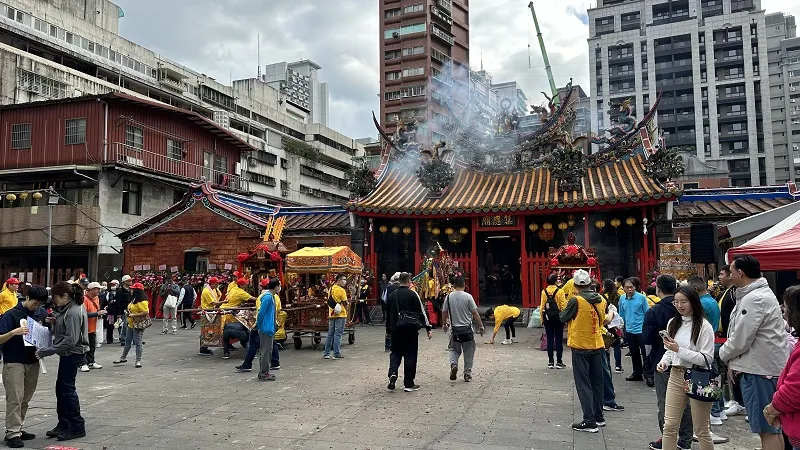
▲A glimpse of the Jingmei Grand Procession (Jingmei Dà Ràojìng).
4. You participated in the International Academic Symposium on "Research on Historical and Contemporary Local Taoism". I want to focus on the contemporary part, i.e. the local beliefs and taoism traditions in the Jingmei area today. What significance do parades like the Jingmei Grand Procession hold for local residents today?
I do not think the Jingmei Grand Procession in Taiwan is particularly special. It is essentially a year-end thanksgiving for peace and good harvest as part of the "Lower Yuan Festival" (下元節)on the 15th day of the 10th lunar month. This makes it a part of the "Upper Yuan (上元節/元宵, Lantern Festival), Middle Yuan (中元節,Ghost Festival), Lower Yuan" trilogy. The Lower Yuan celebrates the birthday of water official Shui Guan Da Di (水官大帝), who dispels disasters and calamities.
When Taiwan was a primarily agricultural society, connections between villages would traditionally be made and maintained through these processions. It would connect people together, thus facilitating mutual aid and emotional connections in rural communities. Now, administrative regions are more prominent than individual villages. Processions now are therefore more a process of forming a larger collective consciousness. In an individualistic society, processions give people from different neighborhoods a chance to talk to each other and exchange information.
An example of the modernization of folk traditions is the Neon Gods we can see - e.g. the Third Prince in the Jingmei Procession (see pictures) - dancing to electronic music while wearing modern accessories.
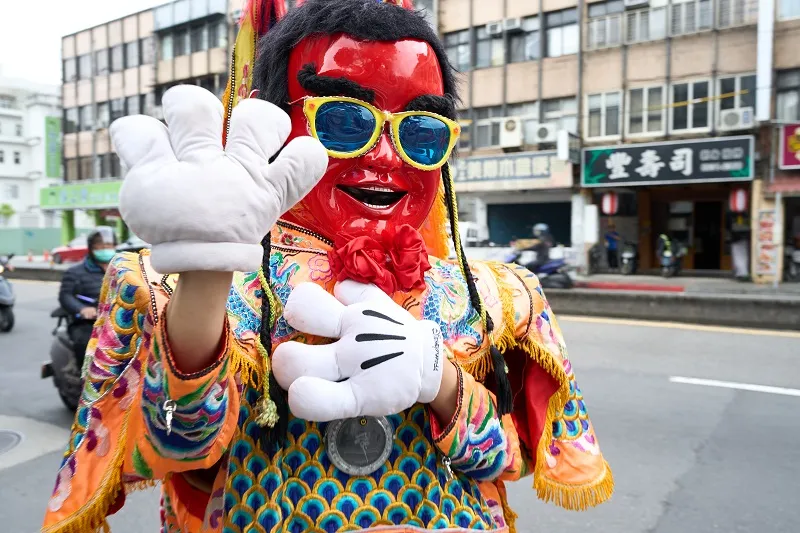
▲The Electronic Third Prince (電音三太子) doing his dance during the Jingmei Procession.
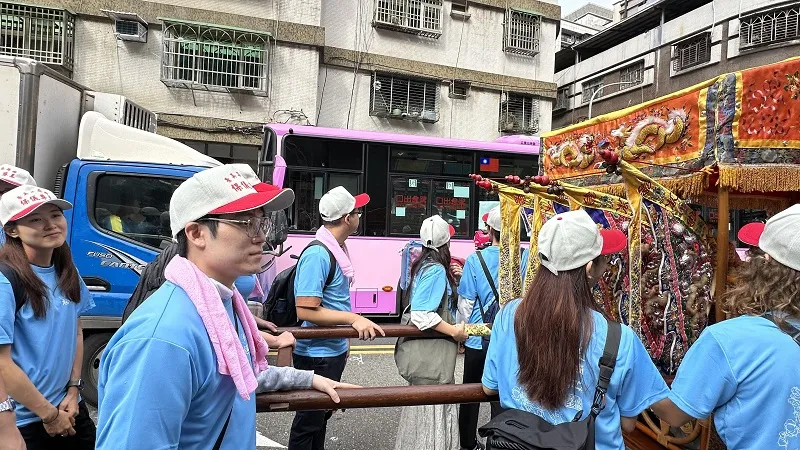
▲Eager international students participated in the procession by carrying the palanquin.
5. How did the phenomenon of the Electric-Techno Neon Gods - e.g. the electronic music-inspired Third Prince (電音三太子) - happen?
The Third Prince was a divine general, not in the sense of a military officer, but more akin to a guardian of the gods. Traditionally, during the procession, individuals would perform dances to help purify the entire area and cleanse the place where the procession is held. The origin of the Electronic Third Prince, as far as I know, is different from how it is portrayed in temple processions and movies. It mainly came from the Taoyuan area.
The Third Prince is often portrayed by young people, who brought the music and dance moves from the nightclubs in the temple processions to replace the more traditional kind of music. That is why people these days find it very entertaining. The most famous display of Electric-Techno Neon Gods was in 2017 during the World University Games sport event. At that time, the mayor of Kaohsiung had incorporated the performance of the Third Prince into the opening ceremony.
To be honest, I do not agree with this phenomenon. First, I do not think deities should be associated with electronic music. As the Third Prince is relatively young, using more lively music is fine, but not that kind. Second, I worry that this trend of Electronic Music Third Prince will lead to a homogenization of festive cultures. Temples from the South of Taiwan already borrow trends and practices from the Northern part that aren’t theirs originally. This leads to every event being more and more similar, erasing each temple or area’s unique characteristics.
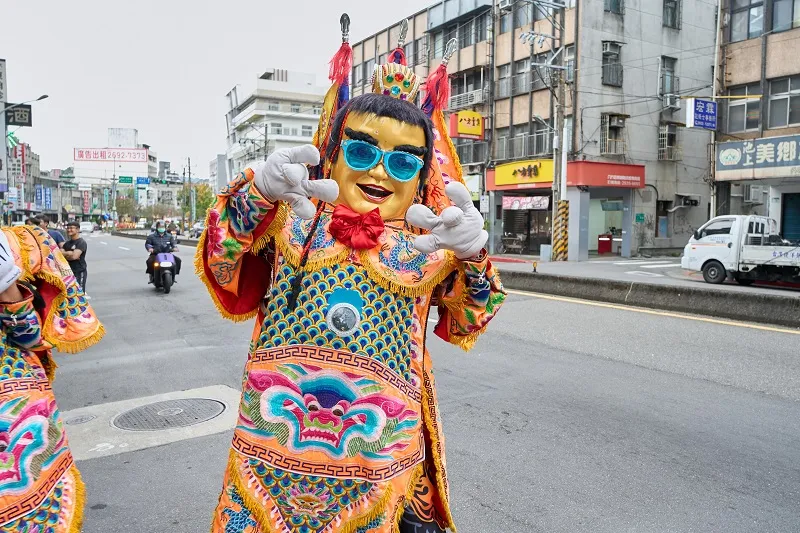
▲The Electronic Third Prince (電音三太子) doing his dance during the Jingmei Procession.
6. In fast-paced modern times dominated by social media, how can traditional folk beliefs continue to be promoted and attract more followers?
In my own understanding, it is mainly because in modern society, we lack what a Japanese scholar called "community consciousness". There is no awareness of such a community. In fact, from the perspective of my university days at NCCU, the Cultural Cup competition was a series and everyone had to participate. That competition became a crucial memory, and it was also an important factor in the feeling of pride and belonging that students felt towards the university. Now, the Cultural Cup allows free participation, so students' identification with NCCU is not as strong. Similarly, if cultural activities hope to form a kind of social identification, they must first have a sense of group consciousness.
If you ask me, as I am more traditional, I do not think it is necessary to integrate new media such as social media platforms and short videos into the temple practices. However, from the perspective of communication, these mediums can attract more people to pay attention to religious rites. Additionally, some online feedback can be useful to take a new modern direction and introduce some new elements to our practices. These new elements may not all be correct, but through communication, we can see what everyone's opinions are.
7. What is the significance of international students participating in the Jingmei Grand Procession? What do you hope they learn or understand from this activity?
Actually, there was a practical purpose behind this. When I encountered the Chief Executive Officer of Jingmei Jiying Temple, he asked me to advise him, since we share the same surname. Jingmei Jiying Temple lacks uniqueness; the processions I mentioned earlier are all outsourced, which does not give it a distinct character. So, he asked me, "What can we do?". In cooperation with professor Tang Ching-Ping and the Office of International Cooperation, we managed to recruit many eager international students to join the procession, as I believed that carrying a palanquin would be a unique experience for them. The Officer liked my idea.
My main goals with this project were twofold. Firstly, I hoped that the temple's processions would not rely solely on outsourced individuals. You have to know that traditional processions are typically voluntary, involving no monetary transactions —just a dinner for everyone at night. Outsourcing creates a commercial relationship, lacking a sense of cohesion.
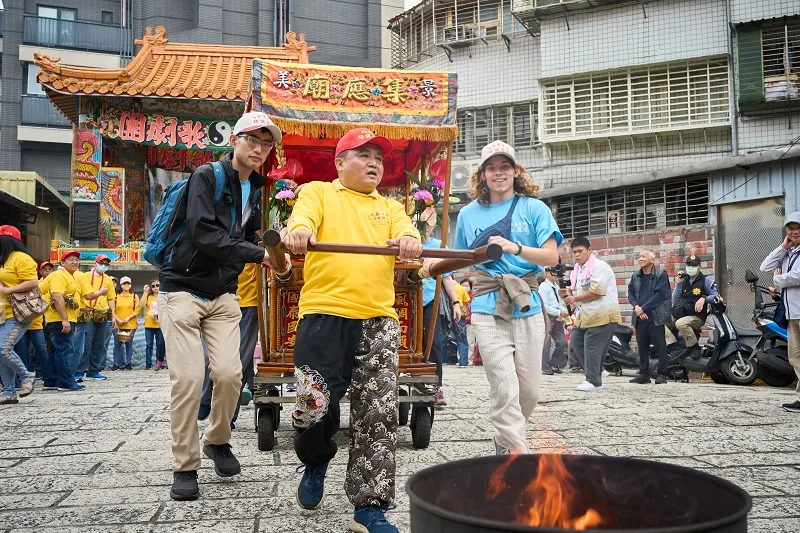
▲Eager international students participated in the procession by carrying the palanquin.
Secondly, I wanted the temple to internationalize. By that, I mean it should not be exclusively focused on the Gao family. It is too closed in on itself, too localized. I believe we need to open up and welcome different people to participate in the processions. A temple, to be lively, needs different people to join. In this way, international students are like a refreshing stream for the temple. They can post about the temple proceedings on Instagram, which is free publicity. When other foreign students come to Taiwan, they might consider your place because of that publicity instead of you having to find local YouTubers to attract them.
8. What resources are available for foreign students who want to learn more about Taiwanese religion?
I have provided a few websites that would be interesting. The following folklore database is the electronic resource at the Traditional Arts Center. If you are interested, you can click on the traditional acrobatics theme knowledge network. There are some interesting videos.
Another database is the "Folklore and Religion" collection under the National Cultural Memory Bank of the Ministry of Culture. However, the internationalization of the two databases needs to be strengthened. The websites are not yet available in English, but you can translate web pages manually by using the translating function in your parameters.
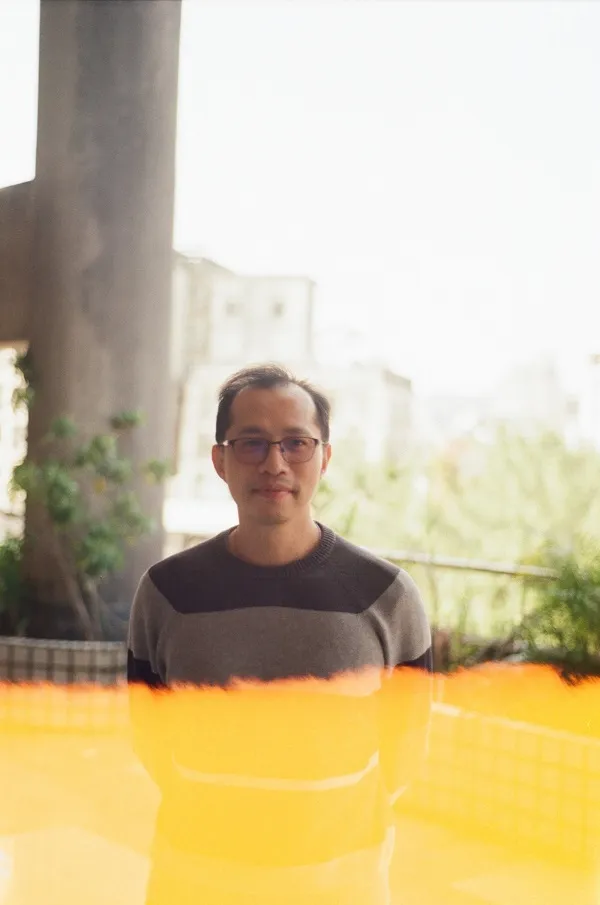
▲Candid portrait of Professor Gao, with a well-timed camera light streak/Photo Credit: Léa Charette.
You can find additional information on Professor Gao on his page on the NCCU Chinese Department website. If you have any questions, feel free to send him an email. We hope this interview has been both interesting and instructive. Thank you for reading!
More on OIC connect no.93:
A Starter Pack to the Lunar New Year
Jasmine Wu: A Student's Voice at COP28
NCCU at the Jessup Moot Court Taiwan Regional Competition 2024
New Student Guide: Addressing concerns adjusting to life in Taiwan
“You’re Not From Here, But Not A Tourist”: Living As A Foreign Exchange Student In Taiwan